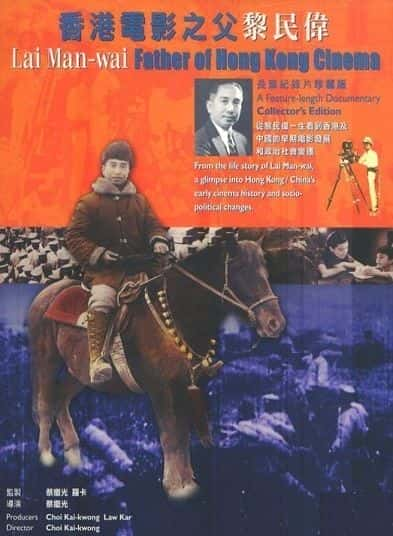|
|

外语原版纪录片《 Lai Man-Wai: Father of Hong Kong Cinema 》 - 纪录片1080P/720P/360P高清标清网盘迅雷下载
Lai Man-Wai: Father of Hong Kong Cinema
纪录片关键词:
Lai Man-Wai: Father of Hong Kong Cinema,Celluloid Man,Cinema Europe: The Other Hollywood,Cinema Hong Kong,Discovering Cinema,Documentary,Eadweard Muybridge's 160 Animal Locomotions,Hong Kong Trilogy,The Posterist (Hui Film),The Story of Film,2001
Biography,Various contributors,Dragon Ray Motion Pictures,2001
纪录片内容简介:
General Information:
Biography Documentary hosted by various contributors, published by Dragon Ray Motion Pictures in 2001- Chinese narrationalso known as `deVêt¯Ì
Information
This feature-length documentary on early Chinese film pioneer Lai Man-wai (Li Minhui) premiered at the 2001 Hong Kong International Film Festival, and has now been released on DVD. Directed by Choi Kai-kwong, it is an indispensable resource for anyone interested in the origins of Hong Kong and Chinese cinema.
Lai Man-wai, born in Japan in 1893 and educated in Hong Kong, became arguably the central figure in the birth in Chinese cinema. The documentary's most valuable contribution to Chinese cinema history is to argue this thesis, patiently, carefully, with copious detail: using interviews with surviving collaborators and family members, contemporary photographs, newsreels, and especially extended excerpts from the films that Lai Man-wai directed, starred in (early in his career), or co-produced, through the Minxin and Lianhua Film Studios.
The film also argues that Lai's political convictions - he joined Sun Yat-sen's revolutionary party in 1911 - played a central role in his filmmaking. From crucial work in pioneering cinema in Hong Kong - along with Joseph Brodsky, he shot Hong Kong's first short film in 1913, Zhuangzi Tests His Wife (Lai played the wife) - through his trailblazing early documentary work shooting Sun Yat-sen's anti-warlord campaigns through southern China from 1921 to 1928, Lai arrived in Shanghai and helped to precipitate that city's "golden age" of cinema. After several spectacular (but money-losing) productions at Shanghai Minxin Studio, he established, with Lau Ming-yau (Luo Mingyou) Lianhua Film Company, the studio responsible for a series of masterpieces in the 1930s that remain among the finest works of Chinese cinema. Lianhua was the studio of the great actress Ruan Lingyu, as well as actors Jin Yan, Chen Yanyan, Li Lili, and Lai Man-wai's second wife Lin Chuchu.
The documentary offers generously long excerpts from Ruan Lingyu's Goddess, New Woman, and Love and Duty, among others, and takes a substantial excursion in order to recount her brief, illustrious career and tragic suicide. The film and stills of her funeral are perhaps the most moving sequences in the documentary.
Following Lianhua's financial decline from the mid-1930s, and the Japanese attacks on Shanghai (Lai felt compelled, characteristically, to record the attacks and destruction in an instant resistance documentary, along with cameraman Chu Shu-hung), Lai and his family left Shanghai for Hong Kong in 1938. The film's story ends with Lai and his family's flight as refugees through China (and their partially successful attempts to save parts of his film library), and his return to Hong Kong, where he died in 1953.
All of this is explained and illustrated in fascinating detail, largely through interviews with Lai's contemporaries. Although the film, at 140 minutes, seemed too long, in need of some judicious trimming when shown at the HKIFF, it fits naturally into a DVD format, whose sections can easily be consulted separately.
The DVD release is graced with superb features and packaging: the film is subtitled in both traditional and simplified Chinese, as well as English, French, German, and Japanese. And the accompanying booklet contains the complete screenplay, production notes, extra photographs, and a fascinating analytical essay in Chinese and English by Law Kar (Lai Man-wai: a legacy of enlightenment") that nicely complements, and in some cases provocatively supplements, the information provided in the film. This disk will become an essential resource for libraries, documentary broadcasters, scholars, and anyone who needs to discover the early history of Chinese cinema. Congratulations to all of the film's creators, including producer/writer Law Kar, writer Stephanie Ng, cameraman Lai Shek (one of Lai Man-wai's eleven children) and director/producer/editor Choi Kai-kwong, to whose two and a half year labour we are all indebted.
Technical Specs
Duration: 2h 19mn
Width: 720 pixels
Height: 480 pixels
Display aspect ratio: 4:3
Frame rate: 29.970 fps
Audio Codec: AC3
Audio stream: Cantonese
Duration: 2h 19mn
Channel(s): 2 channels
Sampling rate: 48.0 KHz
Encoded by: Turbojugend
~~~~~~~~~~~~~~~~~~~~~~~~~~~~~~~~~~~~~~~~~~
外语原版纪录片《 Lai Man-Wai: Father of Hong Kong Cinema 》 - 纪录片1080P/720P/360P高清标清网盘迅雷下载
下载地址:
(本链接可能为BT下载方式,需自备BT类下载工具。推荐使用115网盘离线下载,或使用其他具有离线下载功能的网盘)
游客 文件下载链接就在这里,在您回复评论成功后才能显示。
请勿回复无意义的灌水内容。下拉页面到最底部回复或者 【点击此处快捷回复】,回复后返回此处即可查看下载链接。 如您没注册本站会员,可以点击 注册本站,注册后即可回复下载。 |
小贴士:【影视自媒体解说文案请移步:夏至文案解说网 www.xiazhi.vip】上一篇:外语原版纪录片《 Lafayette: The Lost Hero 》 - 纪录片1080P/720P/360P高清标清网盘迅雷下载下一篇:外语原版纪录片《 Lance Armstrong: Master of Spin 》 - 纪录片1080P/720P/360P高清标清网盘迅雷下载
|